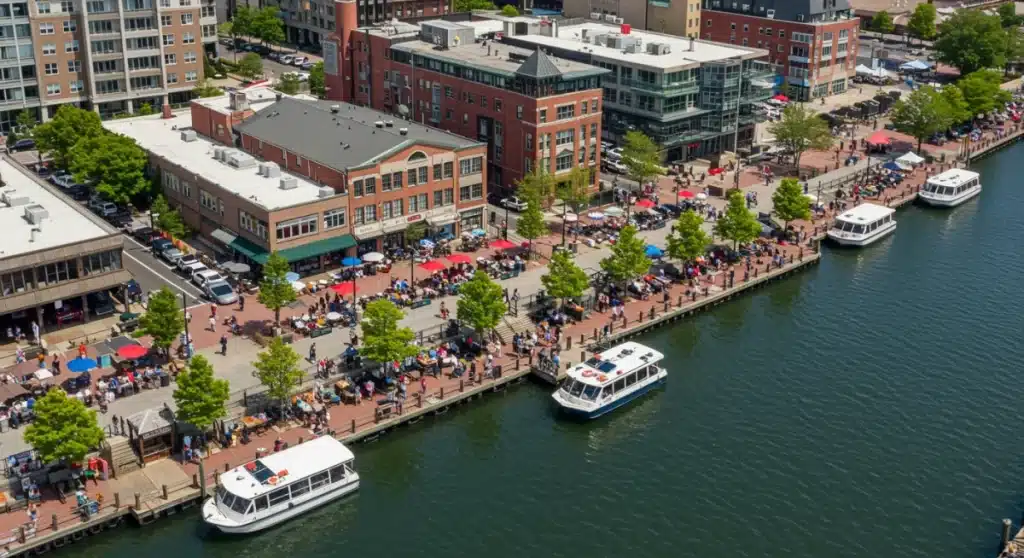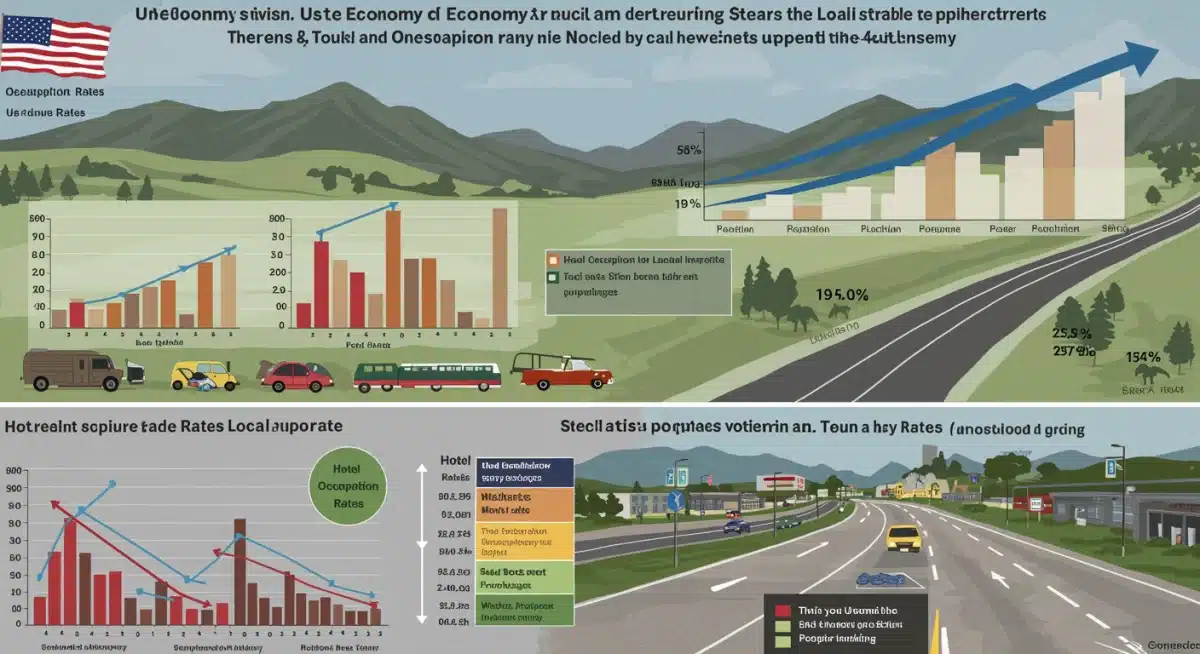Financial Impact of New World Tourism on US Local Economies

The financial impact of New World Tourism on local economies in the US is rapidly evolving, driven by changing consumer preferences and technological advancements, presenting both significant challenges and opportunities for growth.
As of late, a seismic shift in travel patterns is redefining The Financial Impact of New World Tourism on Local Economies in the US. What does this mean for cities and towns across the nation? This developing trend, characterized by a renewed focus on unique experiences and sustainable practices, is actively reshaping economic landscapes.
Understanding the New World Tourism Paradigm
New World Tourism transcends traditional vacation models, focusing on immersive, authentic, and often niche experiences. This shift, driven by evolving traveler demographics and digital connectivity, is currently altering how local economies benefit from visitors.
This evolving paradigm emphasizes personalized journeys over mass tourism, with travelers actively seeking out local culture, sustainable practices, and unique adventures. The implications for economic development are profound, demanding adaptability from destinations.
The Rise of Experiential Travel
Experiential travel, a core component of New World Tourism, prioritizes active participation and genuine connection with a destination. This directly impacts local businesses, from artisan workshops to farm-to-table restaurants.
- Local Business Support: Travelers are increasingly spending directly with small, independent businesses, fostering local entrepreneurship.
- Cultural Immersion: Demand for authentic cultural experiences drives growth in heritage sites, local arts, and traditional crafts.
- Skill-Based Tourism: Workshops and classes, from cooking to pottery, attract visitors seeking to learn new skills, creating new revenue streams.
Sustainable and Responsible Tourism
A growing awareness of environmental and social impact is guiding traveler choices. This focus on sustainability pushes local economies to adopt greener practices and support ethical businesses, influencing investment and operational decisions.
Destinations that embrace responsible tourism principles are seeing increased appeal, attracting a segment of travelers willing to pay more for ethical options. This creates a virtuous cycle, benefiting both the environment and the local economy.
Economic Shifts in Coastal and Rural Communities
Coastal and rural areas, traditionally reliant on seasonal tourism, are experiencing some of the most significant transformations due to New World Tourism. These communities are now diversifying their offerings to attract year-round visitors and different types of travelers.
The shift away from purely beach-centric or wilderness-focused visits means these areas are investing in infrastructure and unique attractions to sustain economic growth. This includes developing agritourism, adventure sports, and cultural festivals.
Diversification of Offerings
Many coastal towns are moving beyond sun-and-sand tourism, developing eco-tourism initiatives and cultural programs. This helps extend the tourist season and attracts a broader demographic.
- Eco-Tourism Growth: Guided nature tours, wildlife observation, and conservation efforts are drawing environmentally conscious travelers.
- Agritourism Expansion: Farms and vineyards are opening their doors for tours, tastings, and stays, providing direct economic benefits to agricultural sectors.
- Adventure Tourism: Kayaking, hiking, and cycling trails are being developed, attracting active travelers and boosting local equipment rental and guide services.
Challenges for Traditional Infrastructure
While opportunities abound, adapting to New World Tourism presents challenges for existing infrastructure. Many smaller communities face hurdles in updating transportation, accommodation, and digital services to meet new demands.
Technology’s Role in Shaping Visitor Flows
Technology is a critical driver in shaping New World Tourism, influencing how travelers discover destinations, plan their trips, and share their experiences. Digital platforms and data analytics are providing local economies with unprecedented insights.
From AI-powered recommendation engines to virtual reality tours, technology is making destinations more accessible and personalized. This requires local tourism boards and businesses to invest in digital literacy and infrastructure to remain competitive.
Digital Platforms and Accessibility
Online travel agencies, social media, and specialized apps are now primary tools for travelers. Local businesses must have a strong digital presence to capture this new market segment.
The accessibility provided by these platforms allows smaller, lesser-known destinations to gain visibility, leveling the playing field against established tourist hubs.
Data-Driven Tourism Strategies
Big data analytics offers local economies valuable insights into traveler preferences, spending habits, and movement patterns. This data is crucial for developing targeted marketing campaigns and optimizing resource allocation.

By analyzing this information, communities can identify emerging trends and proactively adjust their tourism strategies, ensuring sustained economic benefits. This proactive approach helps mitigate risks and capitalize on new opportunities quickly.
Investment and Development Opportunities
The evolution of New World Tourism is creating new investment and development opportunities across the US. Local economies are seeing a surge in demand for specialized accommodations, unique attractions, and enhanced digital infrastructure.
Public-private partnerships are becoming increasingly important in funding these developments, ensuring that growth is both sustainable and beneficial to the community. This collaborative approach fosters innovation and shared prosperity.
Infrastructure Upgrades
Investment in sustainable transport, high-speed internet, and eco-friendly accommodations is crucial. These upgrades not only serve tourists but also improve the quality of life for residents.
- Green Transportation: Development of electric vehicle charging stations and improved public transport options.
- Digital Connectivity: Expansion of broadband internet to support remote work and digital tourism services.
- Eco-Resorts: Investment in accommodations that meet high environmental standards, appealing to eco-conscious travelers.
Support for Local Entrepreneurs
New World Tourism fosters an environment where local entrepreneurs can thrive. Small businesses offering unique products and services are key to providing authentic experiences that modern travelers seek.
Programs designed to support local artisans, food producers, and experience providers are vital for maximizing the economic benefits of tourism. This includes grants, training, and marketing assistance.
Challenges and Mitigation Strategies
While the benefits are clear, New World Tourism also presents challenges, including potential overcrowding, strain on natural resources, and gentrification. Local economies must implement proactive mitigation strategies to ensure sustainable growth.
Careful planning and community engagement are essential to balance economic development with environmental protection and social equity. This ensures that tourism remains a positive force for all stakeholders.
Managing Overtourism
Popular destinations are increasingly facing issues of overtourism, leading to environmental degradation and diminished visitor experiences. Strategies like visitor management systems and dispersed tourism are being explored.
These approaches aim to spread visitors more evenly across a region, reducing pressure on specific hotspots and promoting economic benefits in broader areas. This requires cooperation between various local entities.
Ensuring Equitable Benefits
It is crucial to ensure that the economic benefits of tourism are distributed equitably within local communities. This involves supporting diverse businesses and providing employment opportunities for local residents.
Policies that promote local hiring and procurement, alongside initiatives for affordable housing, help prevent tourism from exacerbating existing social inequalities. This focus on equity strengthens community resilience.
Case Studies: US Local Economies Adapting to New Tourism
Across the US, various local economies are successfully adapting to the demands of New World Tourism, serving as models for others. These case studies highlight innovative approaches and positive outcomes.
From small towns revitalizing their main streets through cultural tourism to major cities developing sustainable urban experiences, the adaptability of these communities is driving significant economic gains.
Asheville, North Carolina: A Hub for Craft and Culture
Asheville has transformed into a vibrant cultural hub, leveraging its craft beer scene, culinary excellence, and mountain setting to attract a diverse range of New World tourists. This has fueled significant local economic growth.
The city’s focus on local artisans and unique experiences has created a strong identity, drawing visitors seeking authentic interactions and high-quality local products. This strategy has proven highly effective.
Bend, Oregon: Outdoor Adventure and Sustainable Growth
Bend has capitalized on its natural surroundings to become a premier destination for outdoor adventure and eco-tourism. The city’s commitment to sustainable practices resonates with environmentally conscious travelers.
By investing in trails, parks, and responsible tourism initiatives, Bend has created a thriving economy that balances visitor demand with environmental stewardship. This approach ensures long-term economic viability.
New Orleans, Louisiana: Preserving Heritage, Attracting Modern Travelers
New Orleans continues to attract visitors through its rich history and unique cultural offerings, while also adapting to modern traveler preferences. The city emphasizes cultural preservation alongside innovative tourism experiences.
Efforts to promote local music, cuisine, and historical tours, combined with a focus on community-based tourism, ensure that the economic benefits reach a wide array of local businesses and residents. This blend of tradition and innovation is key.
| Key Point | Brief Description |
|---|---|
| Experiential Focus | New World Tourism prioritizes authentic, immersive experiences, driving direct spending into local businesses and cultural sectors. |
| Sustainable Practices | Growing demand for responsible travel encourages eco-friendly investments and ethical business operations in local economies. |
| Technological Integration | Digital platforms and data analytics are crucial for destination discovery, personalized planning, and strategic economic development. |
| Local Economic Diversification | Communities are expanding beyond traditional offerings to include agritourism, adventure sports, and cultural events, extending visitor seasons. |
Frequently Asked Questions About New World Tourism’s Economic Impact
New World Tourism emphasizes authentic, immersive, and sustainable experiences, often focusing on local culture and unique activities. Unlike traditional mass tourism, it prioritizes personalized journeys and responsible travel, directly benefiting local economies through direct spending with small businesses and cultural institutions.
Technology, through digital platforms and data analytics, significantly shapes visitor flows by making destinations more discoverable and personalized. It provides local economies with crucial insights into traveler preferences, enabling targeted marketing and optimized resource allocation for greater financial returns and sustainable growth.
Local US economies benefit from increased direct spending with small businesses, job creation in diverse sectors, and diversification of local offerings. This includes growth in agritourism, adventure sports, and cultural events, leading to a more resilient and varied economic base beyond traditional tourism models.
Challenges include the need for infrastructure upgrades (e.g., sustainable transport, high-speed internet), managing potential overtourism in popular areas, and ensuring equitable distribution of economic benefits. Communities must also address environmental impacts and prevent gentrification to maintain long-term sustainability.
Sustainable growth requires careful planning, community engagement, and public-private partnerships. Strategies include developing visitor management systems, promoting dispersed tourism, investing in eco-friendly infrastructure, and supporting local entrepreneurs. These measures help balance economic development with environmental protection and social equity.
Looking Ahead: Impact and Implications
The ongoing evolution of The Financial Impact of New World Tourism on Local Economies in the US signals a permanent shift in the travel industry. Communities that proactively embrace sustainable practices, leverage technology, and champion authentic local experiences are poised for significant economic advantages. We anticipate continued innovation in destination management and a growing emphasis on collaborative approaches between local governments, businesses, and residents to ensure that tourism remains a powerful, positive force for economic development and cultural preservation.